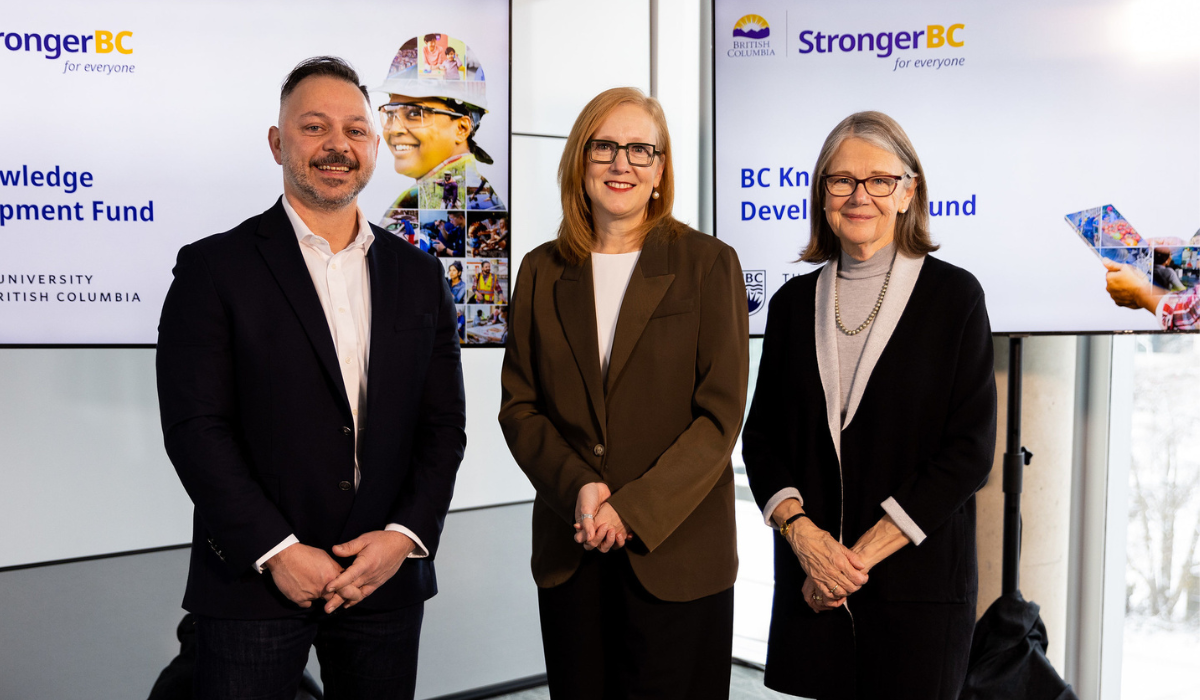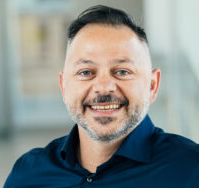
From left to right, Dr. Ilker Hacihaliloglu, the Honourable Brenda Bailey, Professor Deborah Buszard. Photo Credit: Province of British Columbia
Faculty of medicine researchers are among the UBC recipients of funding through the B.C. Knowledge Development Fund (BCKDF) for their work on topics including ultrasound imaging, gynecologic cancers and endometriosis.
At the recent announcement on UBC campus, Dr. Ilker Hacihaliloglu, a professor in the faculty of medicine’s department of radiology and School of Biomedical Engineering, provided a lab tour for the Honourable Brenda Bailey, Minister of Jobs, Economic Development and Innovation. Dr. Hacihaliloglu received funding for his project on artificial intelligence-integrated point-of-care ultrasound imaging that will provide remote, early-stage disease risk assessment of non-communicable diseases.
“Bettering the lives of people through research and innovation is an important part of our StrongerBC Economic Plan and a personal passion of mine,” said Minister Bailey. “The BCKDF gives students and researchers access to state-of-the-art equipment to develop technologies and innovate in areas like cancer treatments and the fight against climate change, helping improve the way we deliver the services that people rely on.”
“These investments from the B.C. Knowledge Development Fund will allow UBC researchers to access the infrastructure they need to advance British Columbians’ quality of life.”
Prof. Deborah Buszard, UBC interim president and vice-chancellor
Through the BCKDF, the Government of B.C. awarded a total of $3.7 million for 13 research projects being led by researchers at UBC, as well as additional projects at the University of Victoria, Simon Fraser University and Vancouver Island University.
“This funding is crucial in the modernization of our universities’ research infrastructure capacity and capabilities, and in advancing the research needed in our province,” said the Honourable Selina Robinson, Minster of Post-Secondary Education and Future Skills. “Supported research projects will make a difference in people’s lives and will help British Columbia become future ready.”
Since the creation of the BCKDF in 1998, the Province has invested more than $862 million for over 1,600 research projects.
“UBC’s campuses in Vancouver and the Okanagan are home to some of the world’s leading researchers,” said Prof. Deborah Buszard, UBC interim president and vice-chancellor. “These investments from the B.C. Knowledge Development Fund will allow UBC researchers to access the infrastructure they need to advance British Columbians’ quality of life by furthering new treatments for disease and approaches to public health, developing knowledge that will improve food security and better prepare B.C. for the effects of climate change and natural disasters, and extending discovery and innovation in cutting-edge technology fields such as quantum computing.”
Faculty of medicine recipients and their projects

Project lead: Dr. Ilker Hacihaliloglu, Department of Radiology and School of Biomedical Engineering
Project title: Infrastructure for AI-integrated Point of Care Ultrasound Imaging for Decentralized Healthcare
The BCKDF is providing $158,055 to invest in infrastructure that will lead to the development of an Artificial Intelligence (AI)-guided point of care ultrasound (POCUS) imaging platform. The system will provide remote, early-stage disease risk assessment of non-communicable diseases. In addition to training highly skilled trainees in AI, the project has the potential to decentralize patient care that will help reach underserved groups who are affected disproportionately of non-communicable diseases in B.C.

Project lead: Dr. Jessica McAlpine, Department of Obstetrics and Gynaecology
Project title: Precision Oncology for Gynecologic Cancers
Gynecologic cancer affects 1,600 British Columbians each year and the number of new cases is expected to rise by one-third over the next 15 years.
The BCKDF is providing $325,000 for an infrastructure project that will accelerate the discovery of new therapeutic targets for rare and difficult to treat gynecologic cancers and enable the development of tools that can determine a patient’s risk and help guide their treatment. The long-term goal of this project is to generate new knowledge that will improve health outcomes for British Columbians with gynecological cancer.
The infrastructure will also enable training of highly qualified personnel on the latest technologies in proteogenomics.

Project lead: Dr. Paul Yong, Department of Obstetrics and Gynaecology
Project title: Endometriosis Integrated Pain Laboratory
Endometriosis is a chronic disease affecting one in 10 people and is a common cause of infertility and pelvic pain including painful periods, sexual pain, and chronic pain.
The BCKDF is providing $75,001 to invest in lab space for state-of-the-art sensory pain testing of the nervous system, which builds on existing lab space to lead to an endometriosis integrated pain laboratory. The expected outcomes are better precision care for endometriosis.
In the short-term, this research will raise B.C.’s profile as an international leader in endometriosis research, and in the long-term there will be cost savings to B.C.’s health care system through prevention of unnecessary repeated surgeries for endometriosis.